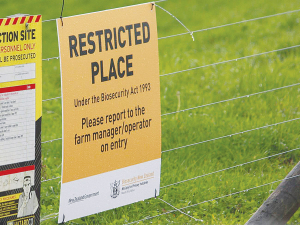We must keep our foot on the pedal
OPINION: Last week marked a major step forward in our work to eradicate Mycoplasma bovis.
 The review panel's recommendations focused on responding to animal diseases, all of which have been accepted, and are being implemented.
The review panel's recommendations focused on responding to animal diseases, all of which have been accepted, and are being implemented.
A review of the Mycoplasma bovis eradication programme has found it is on track to eradicate the disease from New Zealand - a world-first.
It has also made several recommendations to improve the country's wider biosecurity system.
The review found that the programme, a partnership between the Ministry for Primary Industries (MPI), DairyNZ and Beef + Lamb New Zealand, has made improvements since it was beefed up to stop the spread of the disease.
"We have come a long way since the programme started," says M. bovis governance group chair Kelvan Smith.
He claims the improvements made to the programme have prevented long-term financial and animal welfare costs of endemic M. bovis in herds.
"We've previously acknowledged the issues at the start of the programme and the Independent Review acknowledges that lessons have been learned and improvements made," Smith adds.
"There's no denying the disruption and stress experienced by farmers affected by the eradication programme and this review will help to ensure we have better systems and support in the future for disease responses."
The review panel's recommendations covered areas focused on responding to animal diseases - all of which have been accepted and are being implemented.
MPI director-general Ray Smith says the M. bovis programme has provided valuable lessons for future disease responses. He says these are being applied to areas of work like the Foot and Mouth Disease Readiness Programme.
"The M. bovis programme has already led to changes across the biosecurity system, however, there's always room to improve and the review panel's recommendations will help us in the future," he says.
"One of the key recommendations is that we all need to work more closely together to ensure the right capability and support is in place for people affected by a disease incursion."
Smith says the improvements already made or under way include:
"We acknowledge the significant impact the eradication has had on farmers and rural communities, as well as those working on the programme," says review chair Professor Nicola Shadbolt.
"A large number of people, including our farmers, worked incredibly hard to get to where we are now.
"Unique tools and capability have been built, which pur us in a great position and we're on track to be the first country in the world to eradicate M. bovis."
DairyNZ chair Jim van der Poel and Beef + Lamb New Zealand chairman Andrew Morrison say the review has shown that a lot of improvements have been made to the delivery of the programme and highlights what would help biodiversity responses in the future.
A report by a Technical Advisory Group (TAG), released in July, acknowledged the improvements made to the programme to lessen the impact on affected farmers and rural communities. It also confirmed that New Zealand is on track to eradicate the disease.
Current Status
Review recommendations
In February this year, MPI appointed Professor Nicola Shadbolt (Chair), Dr Roger Paskin, Professor Caroline Saunders and Tony Cleland to carry out the review, which recommended the following:
The World Wide Sires National All Day Breeds Best Youth Camp Best All Rounder plaudit has become family affair, with 2026 Paramount Cup winner Holly Williams following in her sister Zara's footsteps.
DairyNZ is giving New Zealand farmers a unique opportunity to gain hands-on governance and leadership experience within the dairy sector.
Herd improvement company LIC has posted a 5.2% lift in half-year revenue, thanks to increasing demand for genetics.
According to the latest Fresh Produce Trend Report from United Fresh, 2026 will be a year where fruit and vegetables are shaped by cost pressures, rapid digital adoption, and a renewed focus on wellbeing at home.
The Roar is a highlight of the game hunting calendar in New Zealand, with thousands of hunters set to head for the hills to hunt male stags during March and April.
OPINION: The past few weeks have been tough on farms across the North Island: floods and storms have caused damage and disruption to families and businesses.